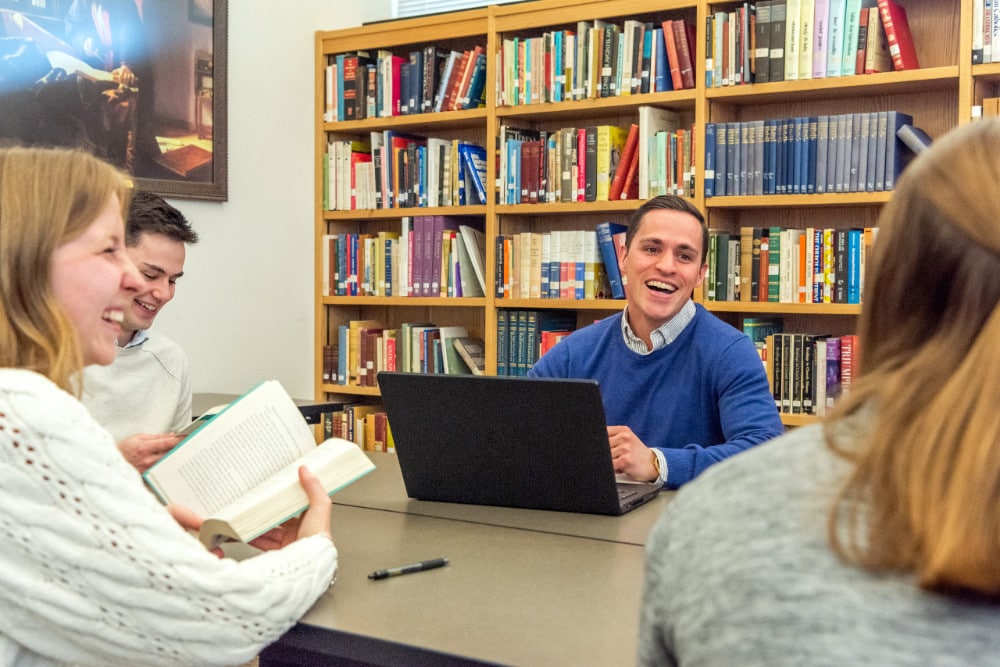Psssst. Want to be an evangelist? Here’s a secret you may not know:
You already are.
Really.
The fact is, you don’t have to be St. Paul, Pope Francis, Venerable Fulton Sheen or Bishop Robert Barron to be an effective spreader of the Gospel. You don’t need to be penning epistles from prison, preaching from Rome or broadcasting to the faithful on television or YouTube. You don’t even have to hold some advanced theological degree or have great rhetorical skills to stand before the world and proclaim the Good News.
You may be doing it right now and not even realize it. Evangelizing lies at the heart of who we are as baptized Christians — and, as a consequencem every choice we make, every word we speak, every action we undertake somehow reflects on who we are and what we believe.
We spend our days — in ways large and small — announcing the Gospel and proclaiming it.
For better or worse, we are evangelizing every day of our lives.
What? You didn’t realize that?
Pull up a chair. You need to hear this.
Pope St. Paul VI expressed this idea beautifully in his 1975 exhortation Evangelii Nuntiandi (“Proclaiming the Gospel”): “Above all the Gospel must be proclaimed by witness. Take a Christian or a handful of Christians who, in the midst of their own community, show their capacity for understanding and acceptance, their sharing of life and destiny with other people, their solidarity with the efforts of all for whatever is noble and good. Let us suppose that they radiate in an altogether simple and unaffected way their faith in values that go beyond current values, and their hope in something that is not seen and that one would not dare to imagine. Through this wordless witness these Christians stir up irresistible questions in the hearts of those who see how they live: Why are they like this? Why do they live in this way? What or who is it that inspires them? Why are they in our midst? Such a witness is already a silent proclamation of the Good News and a very powerful and effective one” (No. 21).

Pope Francis explained our role in all this when he wrote in Evangelii Gaudium (“The Joy of the Gospel”), “Anyone who has truly experienced God’s saving love does not need much time or lengthy training to go out and proclaim that love” (No. 120).
So how can we do that? Not all of us can climb on a soapbox on a street corner and proclaim to anyone who will listen, “Believe! Repent!” (Most of us, I think, tend to be on the shy side anyway; there’s a reason Catholics like to sit near the back when they go to Mass.) But every one of us can have an impact, and quite a few of us can change hearts, educate strangers and even redirect lives by simply going out into the world with an evangelizing spirit — a spirit that calls out with faith, hope and love to people too often overwhelmed by doubt, anxiety and fear.
And in fact, as I mentioned at the beginning, every one of us who has been baptized is already showing the world what we believe, whether we realize it or not.
But how well are we doing that? What is the Christianity we are sharing with others?
And how can we do it better?
Glad you asked.
With a nod to the evangelists Matthew, Mark, Luke and John — the original Fab Four — I’d like to offer four suggestions all of us can employ to make us better practitioners of evangelization. They aren’t difficult or time-consuming — and they may spark ideas of your own to add to them.
These all have one thing in common: They can help all of us show the world the joyful, merciful, hopeful face of Christ. That, in a nutshell, lies at the very heart of evangelization. That’s where it starts.
So, where to begin?
1. Remember the candle
How is that going?
 A priest who was once assigned to my home parish loved the song “This Little Light of Mine,” and I remember that it was played at his funeral Mass. Those of us who heard it that morning couldn’t help but smile. He was always encouraging people to keep their light burning — let it shine! We need to hear that. And that light can be a powerful tool for evangelization.
A priest who was once assigned to my home parish loved the song “This Little Light of Mine,” and I remember that it was played at his funeral Mass. Those of us who heard it that morning couldn’t help but smile. He was always encouraging people to keep their light burning — let it shine! We need to hear that. And that light can be a powerful tool for evangelization.
Many years ago, my wife and I made a pilgrimage to the Holy Land, and one of our fellow pilgrims was a young woman who had just come into the Church the previous Easter. I asked her one day, “What made you want to become Catholic?”
And she replied without hesitation, “It was my boss.”
Really?
She nodded. “I saw how he treated people. His family. His friends. All the people who worked with him and worked for him. He’s just one of the kindest and most thoughtful people I’ve ever met.” And then she added: “There is a light in him. And I said to myself, ‘I want what he has.'”
What a witness. That man was evangelizing and spreading the Faith without even realizing it. And hearing that made me wonder: How many people would say something like that about me? How is my light shining in the world, radiating to others? Do I let it shine? Or do I keep it hidden?
Has it petered out?
A great way for us to evangelize is to nurture that light, keep it burning and share it with others — people whose lives may not always be as bright. The world needs Christians who are incandescent!
2. Listen to yourself
Words matter. Attitude matters. Tone matters. And nowhere is that more critically important today than in the Wild West that is social media.
I spend a lot of time wandering the dusty byways of Facebook, Twitter and assorted corners of the blogosphere. I never cease to be amazed — and often shocked and embarrassed — at how Christians treat one another there. (As a priest friend of mine likes to put it, “See how these Christians shove one another.” I corrected him: “No,” I said. “It’s ‘See how these Christians club one another.'”)
Man, we can be brutal.
 Social media is merciless. It’s ruthless. It’s judgmental. And it’s often just heartless and cruel. We Catholic Christians are quick to judge, label, shame, disparage, dismiss. (And I’m as guilty as anyone else; I do this too often myself. For these and all my sins, I am sorry.) The objects of our discontent range from what kinds of liturgy we like, to what kind of hymns we prefer, and what sorts of attire we wear into the pews. Everyone is a liturgist, a fashion critic, a musical expert, a confessor waiting for an offending Catholic to admit they have sinned by wearing shorts and flip-flops to Mass.
Social media is merciless. It’s ruthless. It’s judgmental. And it’s often just heartless and cruel. We Catholic Christians are quick to judge, label, shame, disparage, dismiss. (And I’m as guilty as anyone else; I do this too often myself. For these and all my sins, I am sorry.) The objects of our discontent range from what kinds of liturgy we like, to what kind of hymns we prefer, and what sorts of attire we wear into the pews. Everyone is a liturgist, a fashion critic, a musical expert, a confessor waiting for an offending Catholic to admit they have sinned by wearing shorts and flip-flops to Mass.
Want to be a brave, countercultural evangelist? Don’t do that.
Don’t give in to pettiness. Steer clear of judging without knowing all the facts. Presume good intentions. Respect those you disagree with. Take time to listen.
A friend of mine, after watching all the carping and criticism on one Facebook thread, texted me to ask, “What do non-Catholics think of this? Why would anyone want to join a religion that treats its fellow believers like that?”
Good question.
We can do better — all of us. By honoring and respecting those with whom we disagree and engaging with them civilly, we can bear witness to simple Gospel values of charity, dignity and compassion.
And we might also, in some small way, send forth that light that we need to shine.
3. ‘Go and do likewise’
I’ve often said that these four words — the conclusion of the parable of the good Samaritan, which sum up the timeless moral of the story — are among the most difficult in all of Scripture.
Every evangelist needs to remember them.
And then we need to try living them.
Often, that means stepping out of our comfort zone. But that, too, is an intrinsic part of the Gospel. When Jesus told his disciples, “Put out into the deep,” he wasn’t just giving advice for fishing. He was telling them: “Go where it’s risky. Leave what you know. Go where it’s uncomfortable and the water is murky and the winds are wild. You’ll be amazed at what you find.”
For us today, this also means: Do what is hard. Be a Samaritan to someone who is broken, hurt, wounded, suffering. Give time. Give patience. Lend a hand and lend an ear. Volunteer for a parish ministry that reaches out to those in need. Strive to be the face of Christ to people who are desperate to see him.
A few years ago, I made a trip to Jordan and visited the extraordinary Italian Hospital in Amman. A small staff of Catholics — doctors, nurses, nuns — cared for poor patients who were predominantly Muslim. The building contains a small chapel. Every nursery, every waiting room, every treatment area had a crucifix or a picture of Mary or Jesus hanging on the wall. I don’t know that the patients paid much attention to that, or if they even knew their significance. But I imagine every person who was treated there went home with this memory: When it mattered, a Catholic hospital was there for them. Christian doctors and nurses and staff members saw people in need and offered the compassionate and loving face of Christ.
Honestly, this can be the most powerful sermon any of us might give — and we do it without saying a word.
Pope Francis once said: “If you happen to be with an atheist who tells you that he does not believe in God, you can read him the whole library, where it says that God exists, and where it is proven that God exists, and he will not believe. [However] if in the presence of this same atheist you witness to a consistent, Christian life, something will begin to work in his heart. … It will be your witness that brings him the restlessness on which the Holy Spirit works.”
Seeing is believing. When nonbelievers see us living out our faith, even in small but tender ways, they see that we have something — Someone — that we believe in.
4. Entertain angels
The world lost a prominent and devoted Catholic in June with the death of political commentator Mark Shields. Paying tribute to his colleague, columnist David Brooks remembered an essay he wrote when Shields retired, noting how his friend lived out his Catholicism. Brooks wrote:
“Mark instinctively identifies with the underdog. Every year he invites me to do an event with him with Catholic social workers. These are people who serve the poor and live among the poor. They have really inexpensive clothing and really radiant faces, and in their lives you see the embodiment of an entire moral system, Catholic social teaching, which has its service arm and, in Mark, its political and journalistic arm.”
What struck me about that was Mark Shields’ eagerness to include a non-Catholic in something explicitly Catholic. He made him a part of his life, his tradition, his values, his faith.
I was reminded of this famous declaration in the Letter to the Hebrews: “Do not neglect hospitality, for through it some have unknowingly entertained angels” (13:2).
Want to do a little friendly evangelizing? Show hospitality! “All are welcome” is more than something we sing at church. It’s an attitude for living the Christian life.
Entertain a friend — or a stranger who just might be an angel! (You just might unknowingly be that person’s angel, at a moment when they didn’t expect it.) Ask someone to Mass. Or a parish social. Or a Christmas concert in your church. Invite them to experience the wonder and mystery of the Triduum, or the glory of Midnight Mass, or the humbling and heartbreaking journey of the Way of the Cross. You never know if you might ignite a spark of curiosity that will lead someone to say, “Tell me more.”
Several years ago, I read the story of a Muslim woman in Iraq during the war. She was deeply impressed by how the U.S. medical personnel cared not only for Americans and Iraqis but also treated wounded enemy combatants – including one who was known to have killed U.S. marines.
She was so struck by that, that this woman approached the chaplain and said to him, with curiosity and with courage ,”Tell me more about Jesus.” He did. He described Jesus and the Gospels. After thinking about this for some time, the Muslim woman finally came up to the chaplain and told him, “I want to become a Christian.”
Since this priest serves all Christians, not just Catholics, he decided to introduce her to chaplains from other denominations. But after talking with them, she came back to the Catholic chaplain and said, “I want to be a Catholic, like you.” When he asked her why, she replied, “You were the only one who told me about the other Christians and let me make up my own mind.”
A journey that led eventually to her baptism began, quite simply, with patience, attentiveness and charity.
It’s also worth remembering: Ours is a faith of senses and sensations — from the music to the incense to the visual power of icons, statues and stained glass. Welcome those who are curious. Help them see what we are all about. Crack open the door and invite them in.
None of these ideas, as I said, are too taxing or time-consuming, and chances are you may be doing some of this already. But all of us can do more. All of us can benefit from developing an attitude of expansiveness, welcome and joy — encouraging curiosity, offering companionship and patience, and fanning the flame to keep that baptism candle glowing.
Believe it or not, evangelists are everywhere.
Want to meet one? Just take a look in the mirror.
Then head out the door and show the world what you have to offer. Proclaim the Good News. As I tell people at the end of every Mass, “Glorify the Lord with your life.”
You may speak volumes without saying a word.
Deacon Greg Kandra is the creator of The Deacons Bench blog and the author of “The Busy Person’s Guide to an Extraordinary Life” (Word Among Us Press, $14.95).
| More from OSV |
|---|
| So, you’re ready to start evangelizing, but you still wish you had more resources. No worries! The OSV Catholic Bookstore has your back. Check out these titles, and get reading!
“Share Christ” Inviting Others into Friendship with Jesus” ($11.95) by Dave Nodar, Dianne Davis and Father Erik Arnold “An Evangelizing Catechesis: Teaching from Your Encounter with Christ” ($19.95) by James C. Pauley “The How-to Book of Evangelization: Everything You Need to Know But No One Ever Taught You” ($19.95) by Jennifer Fitz Find them at osvcatholicbookstore.com. |










